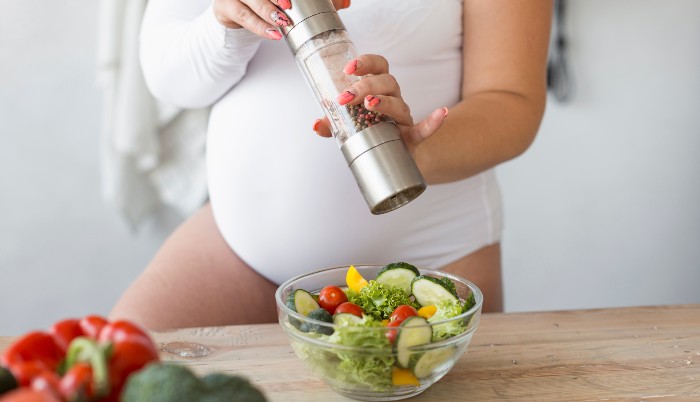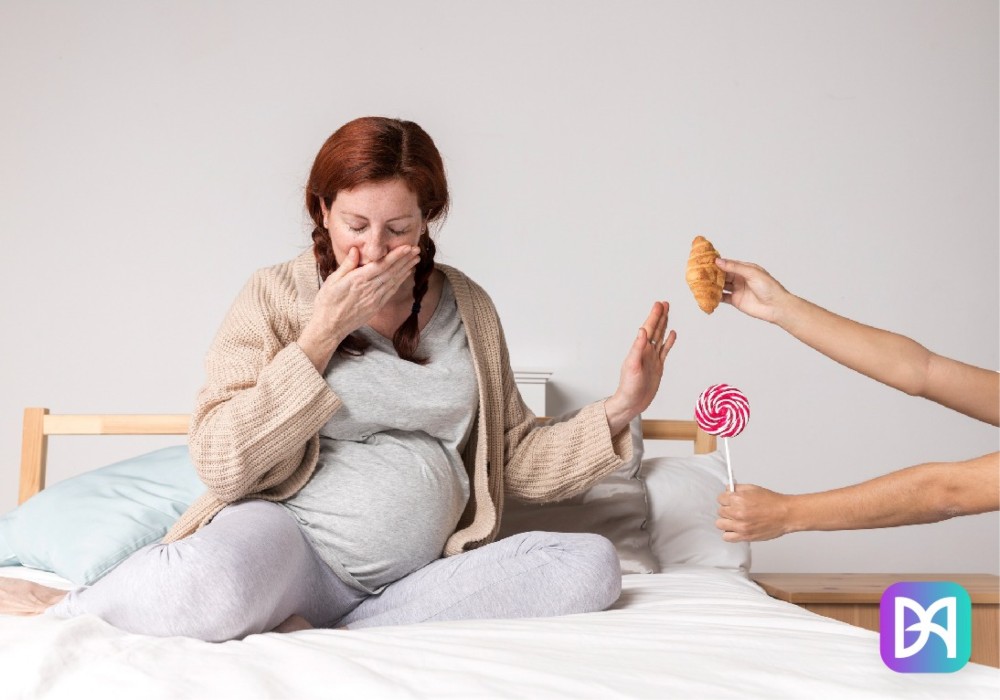Foods to avoid during pregnancy usually increase the possibility of illness, such as raw or undercooked meat or seafood. However, you should also restrict your consumption of refined foods and caffeine.
Table of Contents
Toggle11 foods to avoid during pregnancy
Eating healthily throughout pregnancy is crucial for nourishing your unborn child and yourself. Some of your favorite meals, like sushi, coffee, or rare steak, could have to go. Fortunately, there are many healthful things you can consume while pregnant. The 10 beverages and Foods to Avoid During Pregnancy are listed below.

Undercooked, Raw, or High Mercury Fish
Raw fish, especially shellfish, often carry harmful bacteria or parasites like norovirus, Vibrio, Salmonella, and Listeria. These germs can infect fish during handling, storage, or processing, including smoking or drying. Infections from raw fish can make you dehydrated and weak. Some infections can even pass to your baby through the placenta, even if you have no symptoms. This can lead to serious problems like preterm delivery, pregnancy loss, stillbirth, or other health risks. The CDC warns that pregnant people are up to 10 times more likely to get a listeria infection.
Mercury, a toxic element, is found in polluted water and builds up in fish. High mercury levels can harm your nervous system, immune system, and kidneys. In children, even small amounts can cause developmental problems. Large fish, like sharks or tuna, often have the most mercury. Avoid these high-mercury fish during pregnancy and breastfeeding:
- Shark
- Swordfish
- King mackerel
- Bigeye tuna
- Marlin
- Tilefish (from the Gulf of Mexico)
- Orange roughy
Undercooked, Raw, or Processed Meat
Consuming raw or undercooked meat raises the possibility of contracting dangerous diseases from infectious agents such as Salmonella, E. Coli, Toxoplasma, and Listeria. These bacteria can harm both you and your baby during pregnancy. While most bacteria stay on the surface of whole cuts of meat, some can be inside the muscle fibers.
Whole cuts like tenderloin, sirloin, or ribeye from beef, lamb, or veal might be safe if cooked thoroughly on the outside.
However, this is only true for uncut pieces. If you’re pregnant, it’s safer to avoid undercooked meat entirely. Cut or processed meats like patties, burgers, minced meat, or poultry should never be eaten raw or undercooked. Hot dogs, lunch meats, pepperoni, and deli meats can also carry bacteria from processing or storage. Cured meats, which are not fully cooked, may contain bacteria or parasites.
Processed meats often have high sodium and unhealthy fats. If you eat them, ensure they’re fully cooked, like sausages. To stay safe, stick to well-cooked meats during pregnancy.
Raw Eggs
Raw eggs might have Salmonella bacteria, which can cause illness. Symptoms of Salmonella infection include fever, nausea, vomiting, stomach pain, and diarrhea. In pregnant women, it can cause uterine cramps, increasing the risk of preterm birth or stillbirth.
Foods that often contain raw eggs are:
- Lightly scrambled eggs
- Tiramisu
- Raw batter
- Hollandaise sauce
- Homemade mayonnaise
- Some salad dressings
- Eggnog
- Homemade ice cream
- Some cake icings
- Eggs Benedict
Most store-bought products with raw eggs use pasteurized eggs and are usually safe. Always check the label to be sure. Cook eggs thoroughly or use pasteurized ones to stay safe.
Unpeeled Fruits & Vegetables
These kinds of fruits and vegetables can consist of infectious microorganisms such as Listeria, E. coli, Salmonella, and Toxoplasma. These germs can come from soil or handling. Contamination can happen anytime—during growing, harvesting, processing, storing, transporting, or selling.
Toxoplasma is a parasite that may stick to fruits and vegetables. Most people don’t feel sick from it, but it can harm unborn babies. It may cause vision problems, learning difficulties, or even severe eye and brain damage.
To stay safe, always wash fruits and vegetables with clean water. Peel or cook them before eating.
Unboiled Dairy Products
Raw milk and unpasteurized dairy products can carry harmful bacteria like Listeria, Salmonella, E. coli, and Campylobacter. These bacteria can cause food poisoning, which may seriously harm an unborn baby.
Bacteria can grow naturally or from contamination during collection or storage. Pasteurization kills these harmful bacteria without reducing the product’s nutritional value. To stay safe, choose only pasteurized dairy products.
Soft Cheese
Soft cheeses may have a certain bacteria called listeria which can cause severe Harm and Even Loss of Pregnancy. These cheeses include queso ranchero, queso panela, queso blanco, queso fresco, and queso blando. Those soft cheeses that have pasteurization on its label are safe to consume.
Highly Processed Foods to avoid during pregnancy
Highly processed foods are low in nutrients but high in calories, sugar, and unhealthy fats. They can lead to weight gain.
During pregnancy, your body needs key nutrients like protein, folate, choline, and iron. Gaining some weight is normal, but too much can cause delivery problems and increase the risk of childhood obesity.
Focus on meals and snacks with protein, fruits, vegetables, healthy fats, and fiber-rich carbs like whole grains, beans, and starchy veggies.
Alcohol
Alcohol use during pregnancy raises the danger of fetal alcohol syndrome (FAS), fetal demise, and pregnancy loss. FAS can impact the brain and heart, among other areas of human growth.
It’s better to stay away from alcohol completely during pregnancy because no amount is safe.
Caffeine
Coffee, tea, soft drinks, and cocoa all have caffeine. Research shows that too much caffeine can increase the risk of pregnancy loss, stillbirth, low birth weight, and developmental problems. Caffeine is quickly absorbed and easily reaches the placenta. Since babies and their placentas can’t process caffeine, it can build up to harmful levels. The American College of Obstetricians and Gynecologists (ACOG) advises pregnant women to keep caffeine intake below 200 milligrams (mg) per day.
Contaminated Water
Preventing dehydration during pregnancy requires sipping a lot of water.
In the United States, tap water is usually safe, but dirty or polluted water can harm you and your baby. If you use a private well, the water may not be tested by the Environmental Protection Agency.
If you’re worried about your water, reach out to your local health department or environmental agency for help.
The Final Say
Avoid foods during pregnancy that might endanger both you and your unborn child at all costs. The majority of foods are safe to eat, but it’s better to stay away from things (foods to avoid during pregnancy) like raw seafood, unpasteurized dairy, alcohol, and fish that have high levels of mercury.
Limiting your consumption of processed meals is also advised because they may include high levels of harmful fats, added sugar, and salt.
Frequently Asked Queries (FAQs)
What should be the things to avoid in early pregnancy?
Foods to avoid during pregnancy include those that might infect you, contain chemicals that could harm your unborn child, and are generally bad for your health. Things to avoid in early pregnancy include undercooked or raw meat or fish, uncooked poultry or sprouts, potentially mercury-containing seafood, and highly processed meals.
How to avoid food during pregnancy?
To Avoid Foods During Pregnancy that might be harmful, you must take precautions. For example, eat good quality cooked meat or either used well in a meat recipe rather than having raw or uncooked meat. The same goes for other foods such as poultry or seafood.
What are some foods not to eat when pregnant?
All the foods not to eat when pregnant are explained in the article briefly. You should instead focus on healthy foods including whole fruits, veggies as well as whole grains.




